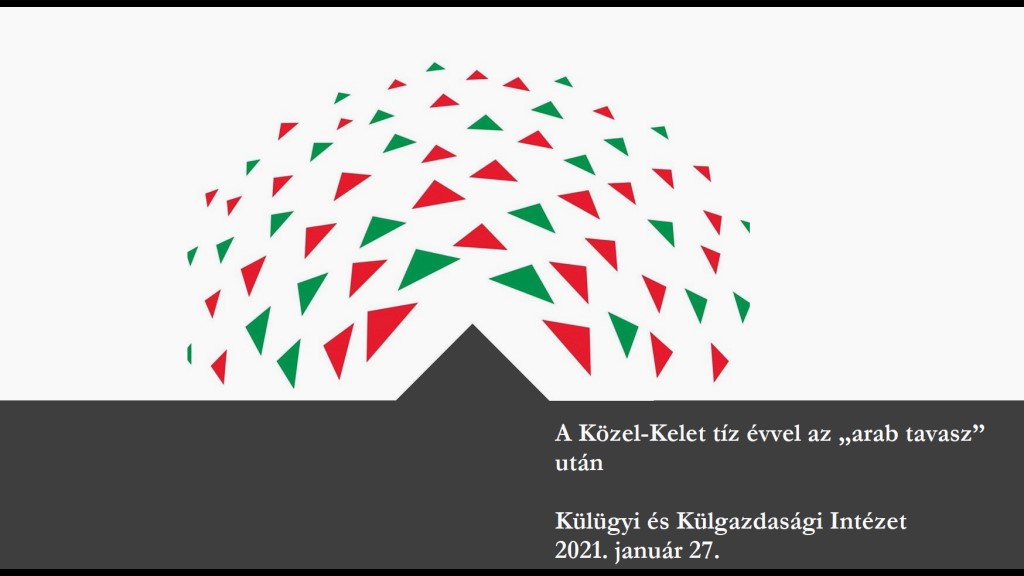On the occasion of the 10th anniversary of the start of the so-called “Arab Spring”, the Institute for Foreign Affairs and Trade organized an online roundtable discussion. The event, which took place on the 27th of January, 2021, was moderated by Tamás Péter Baranyi, the deputy director of strategy of the Institute. Three experts, namely László Csicsmann (associate professor at Corvinus University of Budapest), Máté Szalai and Péter Wagner (senior research fellows of IFAT) gave lectures about specific topics.
In his speech, László Csicsmann talked about the transformation of Middle Eastern political systems. In this process, protests in 2019 represented a new chapter, oftentimes referred to as the “Arab Spring 2.0”. Professor Csicsmann analysed how this new wave of demonstrations fit into the framework of the political transformation process started in 2010/2011 with new particularities. For example, the events of 2019 were more interconnected with anti-establishment protests in other parts of the world, including Chile or France. The aim to replace the entire political elite without any specific political program can also be considered a novelty. Generally, protests were nationalist in the sense that they opposed any form of sectarianism and foreign intervention. Professor Csicsmann highlighted four case studies (Iraq, Lebanon, Algeria and Sudan) in which actors having executive power were forced out.
Máté Szalai focused the transformation of the regional order. In his opinion, the real turning point in this regard was 2003 (rather than 2011), when as a consequence of the Iraqi war, Iranian influence grew considerably. Afterwards we can witness the rise of a new regional order called “competitive heteropolarity”, which dominates regional relations to this day. The most crucial question currently is whether new developments taking place in the region (e.g. the Abraham Accords) are premonitions of the emergence of regional blocks or simply signs of the prevalence of the current order.
In his lecture, Péter Wagner talked about the main conflicts of the Middle East and the main security policy developments taking place in the last decade. He pointed out that the security policy of Arab regimes has emptied out (the so-called “egg effect”). American foreign policy aims has changed considerably since 2010, which incentivised middle powers of the region to intervene more intensely in regional developments. Saudi Arabia, Turkey, Iran the United Arab Emirates or Russia enlarged their presence considerably, using even direct military means in several countries (including Libya, Syria or Yemen).
After the presentations, the three experts responded to questions raised by the moderator and the audience. They touched upon the various signs of the emergence of regional blocks, the role of leaders, as well as the changing role of religiosity and Islamism.
For the full recording (in Hungarian) please click on the link below or visit our YouTube-channel!
JTNDaWZyYW1lJTIwd2lkdGglM0QlMjIxMDAlMjUlMjIlMjBoZWlnaHQlM0QlMjI0NTAlMjIlMjBzcmMlM0QlMjJodHRwcyUzQSUyRiUyRnd3dy55b3V0dWJlLmNvbSUyRmVtYmVkJTJGYndCQ1lNdTJYeGMlMjIlMjBmcmFtZWJvcmRlciUzRCUyMjAlMjIlMjBhbGxvdyUzRCUyMmFjY2VsZXJvbWV0ZXIlM0IlMjBhdXRvcGxheSUzQiUyMGNsaXBib2FyZC13cml0ZSUzQiUyMGVuY3J5cHRlZC1tZWRpYSUzQiUyMGd5cm9zY29wZSUzQiUyMHBpY3R1cmUtaW4tcGljdHVyZSUyMiUyMGFsbG93ZnVsbHNjcmVlbiUzRSUzQyUyRmlmcmFtZSUzRQ==

